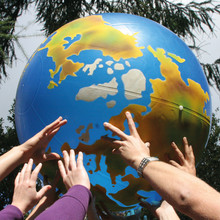Content
The topic “Sport for Development” is booming! We are running numerous initiatives and projects at present.
The positive role of sport in connection with development projects and achieving the UN Millennium Development targets (for example the promotion of equality for women, fighting HIV/AIDS, malaria and other diseases) is indisputable and wide-spread.
Both state and non-state, national and international participants (e.g. NGOs, foundations, governmental and development organisations, ministries, sporting merchandise companies, sport organisations and sport associations) have identified sport as an effective, inexpensive and successful instrument for the implementation of projects.
To ensure the success and sustainability of sport projects in development cooperation, those involved have to demonstrate essential basic knowledge and the necessary teaching skills.
Various sport federations recognize our certificates as a further education course for the extension of their licences (Licence level C/B/A). The secretary’s office of the Department of Further Education can provide details of the course.
Content
The certificate Sport for Development is structured into three components. Each of them is independent and can be completed at any time. The content is based on the different key activities of this wide-ranging occupational field:
1) In the course of the one-week seminar "Inclusive Development Through Sport“, which is carried out by the World Council of Sport Science and Physical Education (ICSSPE), the participants gain valuable and unique views into the application of sport as a means of creating a sense of community, crisis management and social development. International experts from sociology, psychology, social work and sport will give the participants a practice oriented education programme which will demonstrate how to implement sport-related development programmes.
- For further information/contact person/Admission requirements for the ICSSPE-seminar please have a look at the Flyer or Organisation
2)The three-day block seminar entitled „Capacity Building in ‘Sport for Development’: Concepts, Policies, and Project Management“ (organised by the GSU) gives participants an introduction into international development theories and core methods (quantitative and qualitative) required for an academic accompaniment of sport-related development programmes. Conceptual approaches, framework conditions concerning (sport) development and important stakeholders as well as relevant project management techniques of sport-related development programmes are discussed.
- Further information/contact person/admission requirements for the GSU-seminar:
Please have a look at the Flyer or Course Organisation & Recognition
3) A self-organizedinternship (of at least 300 hours) in a national or international organisation/institution/NGO or something similar makes up the third part of the further education course. The placement gives the participants the chance to gain pratical experience in the field and gives them a first impression of where they might want to work later.
Note: Both seminars take place in English.
